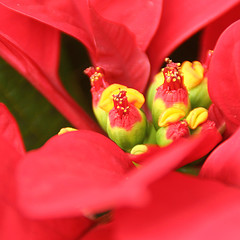 I realise this is a somewhat heretical point of view, but I truly believe that some sorts of biological diversity just aren’t needed. So my heart fell when I read a press release from the University of Illinois that “one day soon a uniquely marbled pink poinsettia will be available to consumers who like decorating for the holidays with a flare for the unusual”. This is not just a gripe against breeding ornamentals. That would be silly. Ornamentals are important and provide lots of people with a living. It is more a gripe against breeding utterly pointless ornamentals. I mean, poinsettias are red. They don’t need to be white, or pink, or marbled. Harrumph.
I realise this is a somewhat heretical point of view, but I truly believe that some sorts of biological diversity just aren’t needed. So my heart fell when I read a press release from the University of Illinois that “one day soon a uniquely marbled pink poinsettia will be available to consumers who like decorating for the holidays with a flare for the unusual”. This is not just a gripe against breeding ornamentals. That would be silly. Ornamentals are important and provide lots of people with a living. It is more a gripe against breeding utterly pointless ornamentals. I mean, poinsettias are red. They don’t need to be white, or pink, or marbled. Harrumph.
Flickr photograph by tsuntsun3, used under a Creative Commons License. And kudos for labelling it flowers; the big red things are the bracts.
Perhaps diversity, like beauty, is in the eye of the beholder? Commercial breeding efforts – whatever their ultimate products – are still breeding efforts and as such can contribute to the overall genetic diversity of a species. In the process of pursuing some objective a breeder will often learn something new about the organism’s biology (e.g., Barbara McClintock and jumping genes in corn). If ideas might be compared to genes, wouldn’t it make some sense to pursue idea diversity?
Thanks for the comment. As it happens, I don’t think you’re right, at least not on the first couple of points, lthough I wholeheartedly support your idea of pursuing idea diversity.
Some diversity may be in the mind of the beholder, but there are also some pretty ferocious statistical techniques for actually measuring diversity, whether in the genes or in the visible aspects of a plant or animal. And breeding necessarily reduces diversity, at least in the end variety, because it is a selective process. I admit that breeding may add to the total genetic diversity of a species, if it involves wide crosses from wild relatives or similar that bring new components into the genetic pool.
I also agree that breeders may learn new things about an organism’s biology. Was McClintock really a breeder? I don’t think so. I think she was a geneticist, who happened to study a domesticated plant. Her autobiography contains no hint that she was seeking particular traits from her crosses, or anything that might be construed as breeding.